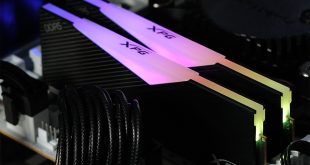For SATA 6Gb/s testing we use a Kingston HyperX 3K SSD. We tested USB 3.0 performance using the same Kingston HyperX 3K SSD connected to a SATA 6Gb/s to USB 3.0 adapter powered by an ASMedia ASM1053 controller.
Operating from the Z87 chipset, the Z87 Extreme11/ac motherboard's native SATA 6Gb/s provide enough bandwidth to offer restriction-free performance to a modern SSD.
The LSI SAS 3008 controller was able to provide restriction-free read throughput for our SATA 6Gb/s SSD, although write speeds suffered a drop of around 50MB/s.
Unfortunately we didn't have enough storage drives to create a large RAID array and fully test the performance of the LSI SAS 3008 controller and 3x24R expander.
ASRock’s XFast USB is able to make use of the extra speed obtained through the UASP protocol. Using the Z87 Extreme11/ac to benchmark a fast SSD over USB 3.0 takes us to the real-world limit of the SuperSpeed interface’s 5Gb/s link speed.
These kinds of USB 3.0 speeds will be particularly relevant for this board's target audience which may consist of users looking to regularly transfer large quantities of data.
The multi-card reader incorporated into ASRock's Wi-SD box uses a Realtek RSTRTS5307 controller to provide USB 3.0-powered transfer speeds. We test its performance with a memory card capable of transfer rates beyond the limit of USB 2.0 speeds.
ASRock's use of a USB 3.0-speed card reader is particularly relevant for photo and video professionals who need to rapidly transfer files from their equipment. The Realtek RSTRTS5307 controller allows our high-speed ADATA Class 10 SD card to perform at its maximum transfer rates.
We use RightMark Audio Analyzer to analyse the performance of the motherboard’s onboard audio solution. A sampling mode of 24-bit, 192 kHz was tested.
Purity Sound uses Realtek’s ALC1150 audio codec to provide a 115 dB signal-to-noise-ratio. Other notable components which form the Purity Sound system include a pair Texas Instruments NE5532 operational amplifiers and isolated circuitry.
The Z87 Extreme11/ac displays ‘very good' audio performance, as measured by RightMark Audio Analyzer. High-quality audio is likely to be of particular relevance to many of the Z87 Extreme11/ac's target users, be it for professional (media creation and editorial work) or recreational (gaming and media playback) purposes.
We run a basic test to certify the functionality of the onboard wireless networking solution.
Windows registered a 300Mb/s (two-stream) connection speed on our Tenda N60 router's 5GHz frequency band. This represents the maximum speed that our router can provide, hence we can safely say that ASRock's chosen wireless network adapter clearly has more performance to give.
 KitGuru KitGuru.net – Tech News | Hardware News | Hardware Reviews | IOS | Mobile | Gaming | Graphics Cards
KitGuru KitGuru.net – Tech News | Hardware News | Hardware Reviews | IOS | Mobile | Gaming | Graphics Cards








Superb review and what a hell of a motherboard, out of my price range, but I agree, its a masterpiece of engineering prowess!
I hear a lot of negative press about asrock, being ‘cheap’ etc, but in recent years its completely changed. I own a Z77 asrock board and its been rock solid, and holds a good overclock. I would buy them again. This is a fully loaded mobo, thats for sure!
Its a good point, Haswell on a core per core basis and clock per clock basis is actually Intels’ ‘fastest’ chip. better than the 4960x etc.
I haven’t read all of the review yet, but it looks to be mighty impressive, with a price tag to match. Good review indeed Luke.
Z87 good chipset. Extreme mainboard